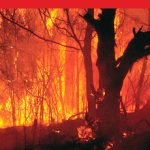
Australians have faced major flooding events in the last year with lives and homes lost. And years after the 2020 bushfires, people are still recovering from the effects of them, when 33 lives and over 3,000 homes were lost.
Feeling stressed, scared or anxious about natural disasters, such as flooding or bushfires is completely normal, even if you’ve not been directly affected.
You might be sad, worried, concerned for family or friends, or simply be wondering what you can do to help.
Feelings: what’s normal and what’s not
According to Beyond Blue, there’s a range of common, normal reactions to an extraordinary situation like a natural disaster. They include:
- feeling overwhelmed
- feeling numb
- not being able to focus or plan ahead
- persistent tearfulness
- intrusive memories and bad dreams
- poor sleep
- constant questioning
- replaying events in your mind
If these feelings don’t subside over time, or they affect your ability to function for more than 2 months after the event, you should talk to your GP or a mental health professional.
You may be eligible to claim, under Medicare, up to 10 individual sessions with a mental health professional each calendar year. Talk to your doctor or mental health professional about it.
Some reactions are beyond what’s ‘normal’. If you experience any of these at any time, you should seek help:
- lack of hope or interest in the future
- avoiding things that remind you of the event, so you’re unable to carry out day-to-day tasks
- being startled easily
- feeling overwhelming fear for no reason
- panic attack symptoms
- excessive guilt
- thoughts about suicide or self harm
If you’re having thoughts about suicide or self-harm, call Lifeline on 13 11 14 to speak with a trained mental health supporter. This service is free and available 24 hours a day.
For some ‘Dos and Don’ts’ when it comes to dealing with the emotional impact of a disaster, visit Beyond Blue.
How to help kids cope with a natural disaster
If you’re a parent or carer, natural disasters can be upsetting for your child, even if they’re not directly impacted by them. They might hear about them at school or childcare, or via other sources, including friends. Media coverage of a disaster can be particularly distressing, so it’s important to limit your child’s exposure to it.
Get more tips and learn how to explain natural disasters to children.
You should also touch base with your neighbours and loved ones. If you’re feeling upset or anxious, it’s likely that others around you will be feeling a similar way.
Other health impacts of a natural disaster
There are other health issues that come with flooding, such as an increased risk of wound infections, diarrhoea, conjunctivitis, and ear, nose and throat infections. Learn about how you can protect yourself.
With bushfires, older people, pregnant women and those with chronic conditions may be more at risk of smoke related illnesses such as asthma. Find out more how you can look after your health.
How to help victims and first responders
It’s great to want to do something to help — and it can make you feel better — but it’s important to contribute in the right way.
Donate money
Many key charities and services have difficulty storing and distributing donations of goods, food and clothes. The best way to help is to donate money. This also allows victims and local businesses to buy the things they really need.
Even a few dollars can make a big difference. Visit these sites to find out how you can contribute:
- Australian Red Cross
- The Salvation Army
- St Vincent de Paul Society
- GIVIT
- Rural Fire Service NSW
- Country Fire Authority Victoria
- Gippsland Emergency Relief Fund
- Country Fire Service Foundation (SA)
- Kangaroo Island Mayoral Relief and Recovery Bushfire Fund
- Rural Fire Brigades Association of Queensland
- Lord Mayor’s Distress Relief Fund (WA)
- WIRES (NSW wildlife rescue and rehabilitation)
If you know someone who is personally impacted by floods or bushfires and they don’t know how to seek help, suggest they check out the Australian Government’s hub on payment and help for people directly affected by bushfires, floods or other natural disasters.
Donate food and goods
If you do have non-perishable grocery items you’d like to donate to those affected by floods or bushfires, visit Foodbank. If you have goods to donate, the Queensland Government-backed charity GIVIT provides specific donated items to those who need them.
Donate blood
The Australian Red Cross Lifeblood service is an important part of flood and bushfire relief. Your blood can save lives, so visit the website to book an appointment to donate blood.
How to find loved ones in affected areas
Visit the Australian Red Cross website, Register.Find.Reunite, to find friends or family members living in affected areas, or to register yourself as safe. The Red Cross can also share contact details (with permission) to reunite loved ones.



